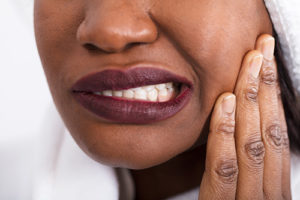Teeth grinding—also called bruxism—describes the habit of grinding together the upper and lower teeth. This grinding activity consists of strongly rubbing the teeth in a repetitive horizontal manner. For a large majority of people, teeth grinding takes place at night. It almost always happens while the person is asleep, so they may not even be consciously aware that they are grinding their teeth while they’re sleeping. Other people grind their teeth during the day or while they’re awake and aware. Your specialty dentist will be able to help you treat your bruxism and find relief.
 Why Do People Grind Their Teeth?
Why Do People Grind Their Teeth?
Teeth grinding is a habitual behavior; that usually happens without being thought about in a focused manner. Like all habits, even when teeth grinding is done while a person is awake and aware, the habit can be hard to break.
There are many reasons why people grind their teeth. Some of them include. Sometimes people grind their teeth when they become overly emotional, just as being very angry. Others may grind their teeth because they lead a stressful life, and the grinding helps in some way to release the pent up stress. Others may grind their teeth because they feel intense worry or anxiety. Still, others may grind teeth because their teeth feel “itchy” or painful, and the grinding puts pressure on the gums to alleviate discomfort. Whatever the reason for the grinding, it needs to be stopped. Teeth grinding is very harmful to the teeth, gums, and jaw.
The Dangers of Teeth Grinding
Teeth grinding can cause all kinds of dental and health problems. These include:
- TMJ: TMJ, or temporomandibular joint disorder, is a chronic condition that affects the jaw. It can be so painful that the person may have difficulty chewing, swallowing, or even speaking. In severe cases, TMJ can cause the jaw to “lock,” making it impossible to open the mouth. When you consider that teeth grinding exerts up to five times more force on your jaw than normal, it’s not surprising that bruxism can lead to TMJ.
- Loss of Tooth Enamel: When you grind your teeth, the force can be up to 800 pounds per square inch. That can cause the enamel to erode on your teeth. The enamel is what protects your teeth from the invasion of bacteria, so a breach in this layer endangers the health of your teeth.
- Chipping and Cracking: With all that force being exerted on your teeth through bruxism, the risk of one or more teeth being chipped or cracked is very high.
- Head, Neck, or Jaw Pain: People who grind their teeth continuously usually suffer from head, neck, or jaw pain or even all three. This pain may also manifest itself as migraine headaches.
Symptoms of Teeth Grinding
There are common symptoms of teeth grinding that you can be on the lookout for. When you visit your dentist, they will also be looking for signs that you may be grinding your teeth; either consciously or unconsciously. These include:
- Overly worn tooth enamel
- Overly sensitive teeth
- Tooth pain
- Sore jaw or soreness in facial muscles
- Chronic headaches, from mild to severe
- Worn-down teeth
- High incidence of chipped or cracked teeth
Lovett Dental Baytown’s Treatment For Teeth Grinding
Your dentist at Lovett Dental Baytown has several treatment options available for teeth grinding. Depending on your individual circumstances and why you’re grinding your teeth, one or more treatments may be appropriate. For example, you may benefit from:
- Mouthguard: A custom mouthguard can help break the habit of teeth grinding. Worn at night, this device protects your teeth and keeps you from being able to grind teeth together.
- Orthodontic treatment: This is a gentle treatment that helps to realign teeth to their correct position. This treatment involves the use of varying types of dental appliances.
If you would like more information about teeth grinding or suspect that you have these issues, please contact us today at 281-838-8400.
